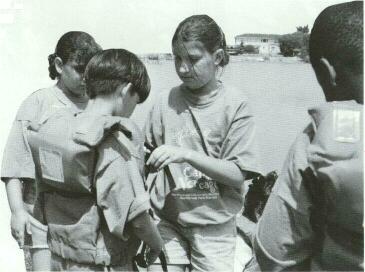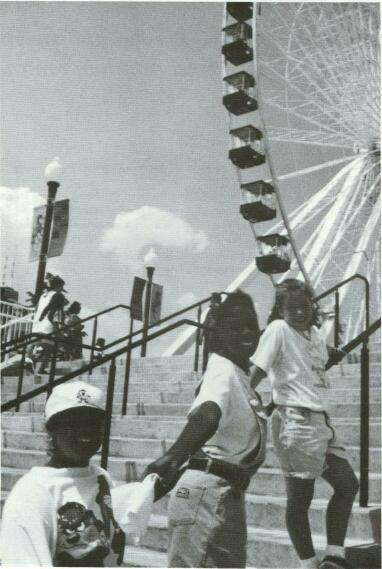 |
Home | Search | Browse | About IPO | Staff | Links |
 |
Home | Search | Browse | About IPO | Staff | Links |
PARTNERSHIPS
PARK DISTRICTS, FOREST PRESERVES AND RECREATION DEPARTMENTS WORKING TOGETHER WITH CIVIC AND BUSINESS LEADERS TO BUILD OUR COMMUNITIES
Each day children face growing pressures from the struggles against crime, drugs, and racism. Our children are becoming separated from one another instead of united together. Their lives often reflect indifference not unity. Now, more than ever, we must recognize our personal responsibilities to our children and learn to be creative in accepting our roles in solving the problems we face.
Our diverse cultures can be a learning experience for today's children. Each culture has the ability to enrich our lives, to share with us its uniqueness, and to help us reach a common bond. It is from these beliefs that the Northbrook Park District began its diversity program.
The Northbrook Park District and Northwestern University Settlement House, a nonprofit social service agency in Chicago, have collaborated on a project to address our shared problem of cultural isolation. The district has long recognized the void of cultural diversity in its community. Even though its neighbor, the city of Chicago, is one of the most significant melting pots in the world, the people of Northbrook largely live in isolation from it. Likewise, the neighborhoods in Chicago experience similar isolation from the suburbs.
This is not solely a social issue. Many corporations are convinced that diversity in the workplace contributes to good business decisions and is very important to the economy. Often the corporate environment is the first place where different cultures meet. Thus, the isolation experienced in youth can bring inhibiting factors to adulthood, making an early introduction to cultural diversity a possible solution.
Our collaboration recognizes that our young people have the same basic need: to learn how to junction in one another's environment.
From this understanding, and after a series of lengthy discussions between both organizations, it was decided that a traveling day camp would be an ideal program to integrate

March/April 1997 / 9
PARTNERSHIPS
| In a span of three years, the Camp Norcago program has enriched 120 children, their families, 36 corporate and civic groups, and staff. |

multicultural philosophy and cultural awareness. This included the awareness that both communities would benefit from a diversity program and gain from each other's experiences. Specific program goals included:
• Introduce a variety of cultural and educational experiences to children of varying ethnic backgrounds;
• Collaborate with a nonprofit agency on issues of social importance;
• Involve corporate and community organizations for support;
• Provide children an opportunity to explore Chicago and North Shore suburbs;
• Develop a pilot program for other agencies to model;
• Establish an informative, exciting camp curriculum for kids ages 10 through 12;
• Complete a thorough evaluation process of campers, parents and staff; and
• Produce a 15-minute video for future marketing efforts.
The resulting summer day camp program was called "Camp Norcago," derived from the combination of Northbrook and Chicago. The camp involves 40 young people: 20 from Northbrook and 20 from the West Town neighborhood in Chicago. The adolescents, ages 10 through 12, spend their days together enjoying equal exposure to the experiences both the city and the suburbs offer within a context that fosters learning and lifelong communication skills. The camp provides an opportunity for children from a variety of ethnic, racial, social and economic backgrounds to participate on equal terms.
The four-week session includes programming focusing on the arts and museums, architecture, environment, government, recreation, and transportation. The camp utilizes a school bus for the daily exploration to the various sites. Both Northwestern Settlement and Northbrook Park District utilize facility space as a morning and afternoon drop-off point with the traveling camp spending time equally at city and suburban venues. Each participant pays a nominal fee for the four-week program.
An added component for the 1997 camp includes a three-night stay at Northwestern University Settlement's residential camp in Wisconsin. This opportunity will provide the children with exposure to daily living situations in a neutral environment.
Potential participants of the camp apply to the program. After the application form is completed, the children and their parents are invited for an interview with staff. The screening process is an integral aspect of selecting the children. It is imperative that both the children and the parents are aware of the nature of this camp. Specifically, children are selected based on their keen interests in the session themes and their desire to interact with children from the city and suburbs.
Another noteworthy component of this camp is the funding. The majority of the expenses for Camp Norcago is offset by generous contributions from local
10 / Illinois Parks and Recreation
DIVERSITY CAMP UNITES CITIES AND SUBURBS
civic organizations, corporate sponsorship and private donations, drawing equally from the city as well as the suburbs.
Grant proposals are sent to a specific foundation, civic group or corporation based on our match with their guidelines. Proposals target Chicago and North Shore sponsors who have a vested interest in the communities where their employees work or live. For example, the Cudahy Foundation in Evanston made the largest monetary contribution at $5,000. Others included the Junior League of Evanston ($1,500), Abbott Laboratories and the Northbrook Crate and Barrel (both at $1,000).
The program relies almost entirely on community resources to underwrite the cost of the camp which averages $21,000 per summer. Trip sites utilize community resources to the fullest extent by visiting sites such as the Northbrook Village Hall and Chicago City Hall. At die Village Hall, campers are given a tour by the Village Clerk and the Village Planner. They also have an opportunity to participate in a mock board meeting staged in the Village board room.
Further community involvement includes the city of Chicago supplying lunches for the entire four-week program to all participants. This is made possible through a summer luncheon program established by Mayor Richard M. Daley's Office. Trip sites in Chicago include The Mexican Fine Arts Museum, The Art Institute, Navy Pier, Harold Washington Library and riding the Metra Train to O'Hare for an airport tour. Incorporating community resources include visiting local park district venues such as the Wheeling Aquatic Center, The Grove in Glenview and the Northbrook Theatre.
The most dynamic aspects of Camp Norcago, however, are the children. The children represent a diverse mix of ethnic backgrounds including Mexican, Russian, African American, Polish, Korean, American, Asian and Puerto Rican. The program provides the participants with an early introduction to cultural diversity in a setting that fosters friendship and adventure.
The 40 children experience many sights and situations that a general day camp cannot provide. Many have never had the opportunity to see the beauty of the Botanic Gardens, to hear the roar of the fans at Wrigley Field, or to paddle a canoe around Lake Shermerville.
According to Karen Browne, assistant superintendent of leisure services at Northbrook, "Participants for the past two years have expressed that Camp Norcago has proven to be a truly valuable experience for them. The benefits of inter-community programs expose children to experiences and friendships that normally would not cross their path."
Evaluations are conducted at three intervals: prior to camp, at camp conclusion and six months after the program has concluded. The evaluation process involves the children, their parents and the staff. Each group receives questions pertinent to their specific involvement in the camp.
Reflecting on his involvement in Camp Norcago, an eleven-year-old Chicago youth writes, "Diversity camp meant a lot because I learned about other people's cultures and I made some new really great friends."
The camp program concludes with a Friday afternoon reception attended by campers, staff, sponsors, and families of the campers. At this reception, the children have the opportunity to speak before the group to share their camp experience. Staff provides a review of the four-week session and provides special awards to each of the participants. The sponsors are recognized for their generous contributions and parents are acknowledged for their support of this unique program.
In a span of three years, the Camp Norcago program has enriched 120 children, their families, 36 corporate and civic groups, and staff. This multicultural collaboration will have a lasting impact on the West Town and Northbrook communities.
The greatest success of this program, however, is introducing the children to cultural diversity in a setting that fosters friendship, play, and lifelong communication skills.
ANN M. ZIOLKOWSKI
is the public relations
and marketing supervisor for the Northbrook Park District.
SANDRA WHITMORE
is the superintendent
of leisure services for the Northbrook Park District.
Northbrook's diversity program received the 1996 NRPA KUDO'S Award for Best Short Film Promoting Recreation and the 1995 IPRA Innovative Program Award. For information about implementing a similar diversity camp program in your area, contact Sandra Whitmore al 847.291.2960.
March/April l997 / 11
|
Sam S. Manivong, Illinois Periodicals Online Coordinator Illinois Periodicals Online (IPO) is a digital imaging project at the Northern Illinois University Libraries funded by the Illinois State Library |